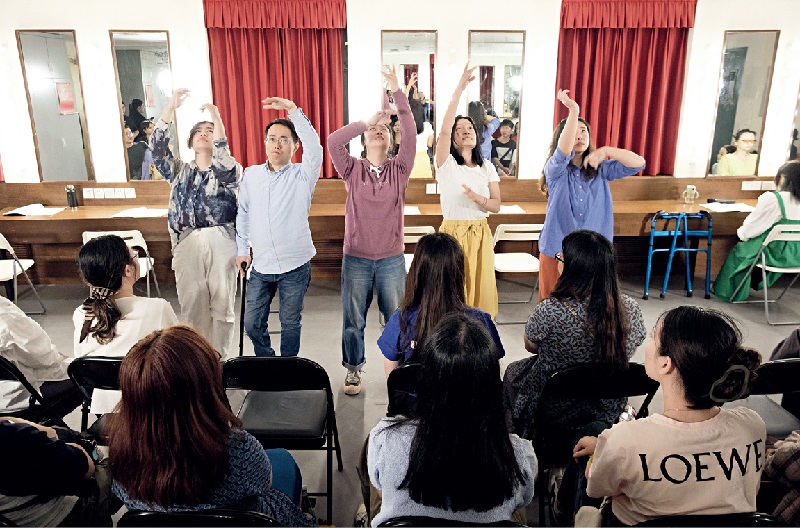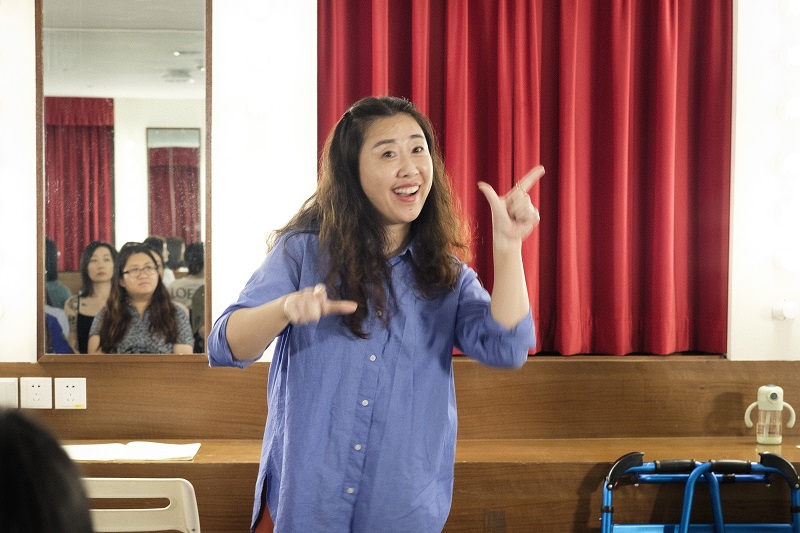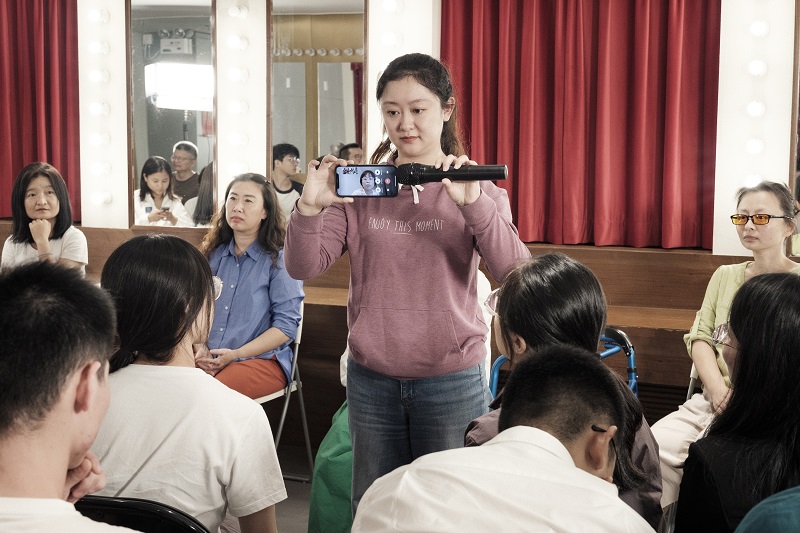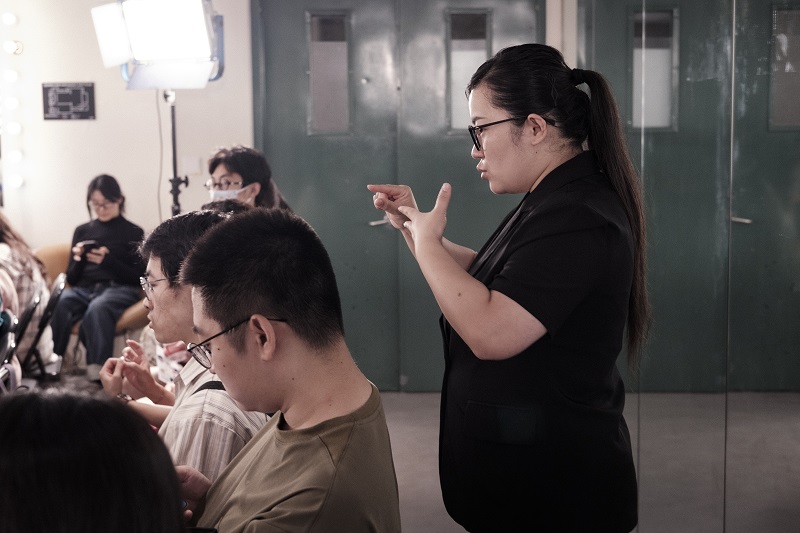
And Suddenly I Disappear: the China/UK/SG ‘d’ Monologues is performed in Beijing on September 17, 2023.
When the soft, soothing background music faded out and the mirror headlights turned on one by one, seven people walked out onto the stage and the show began. It was a unique experience. All seven were non-professional performers with different disabilities, ranging from vision and hearing challenges to mental disorder.
Besides spoken language, they also used body movements and sign language, and a sign language interpreter was present to communicate to the audience. The protagonists delivered five monologues based on their own life stories, showing their passion for life, pursuit of equality in education and employment, and awareness of the rights of people with disabilities, which triggered strong empathy in the audience.
And Suddenly I Disappear: the China/UK/SG ‘d’ Monologues, staged in Beijing on September 17, continued the trend started by British playwright Kaite O’Reilly, who authored the original series. It was based on the lives of the deaf and other disabled people in the U.K. and Singapore, cramming in several languages as well as the British and Singaporean versions of the sign language, and even calligraphy, when one of the earliest shows was performed in the U.K. in 2018.
The Beijing shows are China’s first “accessible” monologue series based on the concept of the social model of disability from the perspective of people with disabilities. The Chinese version of the monologues was directed by Chinese drama director Chen Ran, produced by Beijing Body On & On Culture Center and sponsored by the British Council.

Wang Yiming performs sign language during the show.
Inclusive Arts in China
Inclusive arts are an emerging genre with works jointly created by able-bodied artists and artists from the disabled or minority communities, and presented through drama, dance, and visual art. They emphasize the expression of subjectivity. The disabled, the elderly, and women tell their own stories themselves in this art form. Disability arts is one of the important branches, based on the concept of the social model of disability first proposed by British disability rights activist Mike Oliver in 1983. Since then, a variety of distinctive troupes and art festivals have emerged around the world.
Ge Huichao, founder of Body On & On, worked as a reporter in the field of the performing arts. She was also a producer of modern Chinese dance. When she led a Chinese dance troupe to perform in the U.S. in 2016, she saw an arts show in which all the artists were disabled. “It was the first time I saw this form of contemporary art performance and I felt quite shocked,” Ge said.
In 2019, Ge founded Body On & On to explore the social value of the arts, art exchange, and public education. The team also launched China’s first non-profit art festival focused on inclusive arts – the Luminous Festival, which aims to connect different groups with the arts and encourage art creation in communities of the elderly and people living with disabilities.
In the early days of its establishment, Body On & On mainly worked to introduce inclusive arts to China and explore the development of this genre in China. Today, some non-profit organizations have emerged in Beijing, Guangzhou, Shenzhen, and other cities in China, producing various types of performing arts featuring people with disabilities or other groups.
“Inclusive arts can be integrated with the Chinese culture of inclusiveness and the principle of putting people first. We hope that our arts can promote connection, unity and inclusion among different people and caring for the people,” Ge told China Today.

Momo (standing in the middle) uses a microphone to amplify director Chen Ran’s answers online during the after show discussion.
Acquiring a Chinese Identity
The third Luminous Festival in 2021 screened a video of And Suddenly I Disappear: The Singapore ‘d’ Monologues. In 2022, Body On & On launched an international cooperation project for the Chinese version of the monologues, with the goal of highlighting the real-life experiences of Chinese with disabilities.
O’Reilly drafted a questionnaire with over 30 questions for the play. The Chinese team used it to collect the experiences of nearly 80 respondents. Next, the producing teams from the U.K., Singapore, and China organized an online workshop, inviting respondents to share their stories and try to improvise. Through the exchanges at the workshop, O’Reilly learned more about Chinese society and culture to draft the final script.
In March 2023, the rehearsals started with seven recruits in Beijing. Due to the different disabilities of the performers, an accessible space was created for them and high technology was used to help them communicate, such as the voice-to-text functions provided by WeChat and iFLYTEK.
Lin Zhuoxing, who is hearing-impaired, is one of the performers. When other people speak at the same time, her hearing aid turns on the quiet mode and she cannot hear what is going on. She faced this problem during the rehearsals as well, and after learning this, the other participants tried to avoid speaking at the same time. They would also face her if they needed to share important information so that it was easier for her to get the information.
“People’s needs are different. From the very beginning, we created an atmosphere where everyone feels safe. We encouraged them to express their needs directly and negotiate together for solutions,” Chen Ran told China Today.
After less than seven days of rehearsal, the series premiered at Beijing Chaoyang Joy City on March 26, where they gave two performances. Many viewers said it was the first time they saw such a performance and they understood the situation of the performers with the show, an opportunity for the performers’ equal participation and free expression. The most impressive feedback, according to Chen, came from a child. “He said he saw that everyone was very different and had their own way of expressing themselves,” Chen said.
O’Reilly and Singaporean actor Tung Ka Wai congratulated the team on the success of the premiere, saying they were very happy to work with them.

A sign language interpreter (right) helps deaf people communicate during the activity. Photos by Li Xiaocao
A Platform for Growth
The series has been performed five times in China so far, and during the process, both the performers and the producing team experienced their own personal growth.
Guan Shilian has a leg disability. At first, she worried whether she would be able to travel and communicate with the others. But with the encouragement of the team and their help, she gradually overcame her worries and shyness during the performances, and was able to communicate with the audience in her own way.
Wang Yiming, who has a hearing impairment, is the sign language consultant for the monologues. At the first Luminous Festival in 2019, the shorthand subtitles and sign language translation ensured that she could enjoy the event. So, when she saw the team was recruiting people, she immediately applied. At first, she was not sure if her sign language skills were adequate for the audience. But with Ge’s support, she acquired confidence and soon began to feel it was her mission to raise the voice of the deaf.
“At every rehearsal and performance, I can sense every performer’s growth. They eventually accept their imperfections, build self-esteem, and gain more understanding of others. After the performance, they were willing to talk and share their experiences and opinions. I’m delighted to see this big change,” Wang told China Today.
Chen Ran said she will incorporate the concept of inclusive arts in her future work. “One of the most important things I learned in the project is that each of us may encounter obstacles at different stages and situations in life. Participating in inclusive arts made me see that each person is unique and has creative potential. This field is a new area for us and there’s a lot to learn,” she told China Today.